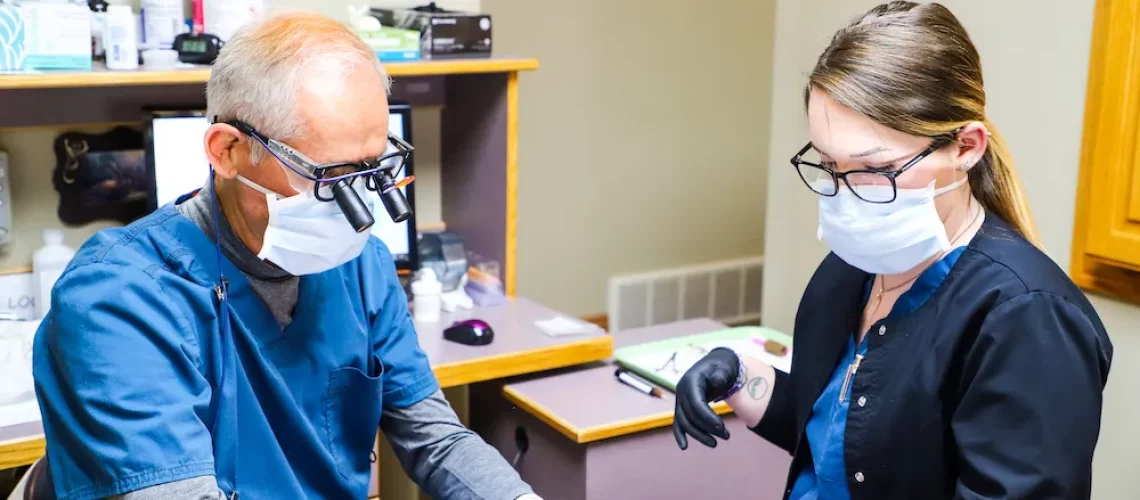As you go over your calendar, you feel a great deal of dread as you see your six-month dentist appointment is approaching. With each passing day, you get increasingly worried, wondering why you have to go to the dentist at all. If this describes you, you are not alone. Anxiety or fear prevents between 9% and 20% of Americans from visiting the dentist.
It might be unsettling to have someone examine a private part of your body, such as your mouth, gums, and teeth. Others, on the other hand, may experience anxiety that is more than just moderately unsettling. People who are worried about going to the dentist may be so afraid of what they may encounter that they avoid going altogether, resulting in small problems becoming serious ones.
Causes of Dental Anxiety
- Past experiences: From a frightening first encounter as a kid to a procedure gone awry as an adult, a patient’s dread of the dentist can stem from a variety of sources. After a traumatic encounter, the concern, “What if it occurs again?” drives the patient to be uncomfortable around dentists.
- Fear of Embarrassment: If someone neglects to care for the health of their teeth and gums, they may be anxious to hear about the consequences of their behavior. They may require more than a standard cleaning to correct the problems created by not brushing, flossing, or eating unhealthy foods. This sense of shame may develop anxiety, with the patient avoiding annual cleanings.
- Pain: The most prevalent reason patients intentionally avoid going to the dentist is the fear of pain. Whether it’s a dread of needles, drills, or even the painful feeling of having another person examine your mouth, many patients’ perceptions of pain are inextricably tied to dental treatment in their minds.
6 Tips for Dental Anxiety
- Speak up
The most critical step in overcoming your dental phobia is to speak out. Don’t be afraid to inform our staff members about anything that makes you worried or uncomfortable while you’re booking your appointment. They’ll make a note of it in your file.
It’s good to tell your dental hygienist that you’re nervous about certain aspects of your visit once you’ve arrived. Dentists want to know what makes you nervous so they can give ways to make you feel more at ease.
- Ask Questions
Communication is the bedrock of any healthy relationship. It’s ideal to express your concerns, anxieties, and worries early on, even before you schedule an appointment with a dentist. This way, you’re providing the dentist with a way to assess your situation and tailor an action plan to your specific needs. Dentists will usually create indicators and indications if you wish to take pauses or stop the treatment if you get uncomfortable.
Don’t be scared to ask the dentist for an explanation of what they’re doing throughout a procedure. A soothing voice may frequently help you get through dental procedures.
- Practice Relaxation Techniques
Relaxation activities might assist you in remaining calm throughout therapy. Controlled breathing, which involves taking a deep breath and gently exhaling, is one method for relaxing. This will assist in relaxing your muscles and slowing your pulse.
Anxiety might intensify while waiting in the waiting area or in the dental chair. In this case, meditation is a simple practice that can help reduce stress and promote calmness. It entails a state of heightened awareness, focus, and muscle relaxation that can be achieved anywhere, including your dentist’s office. Close your eyes or concentrate your gaze on an item once you’re seated, and then allow your body to totally relax. Pay attention to different regions of your body and make a deliberate effort to relax your complete body, beginning with your head and ending with your feet. You can stay calm and attentive by meditating before and throughout your visit.
- Entertainment As A Distraction
Some dentists provide in-chair entertainment, such as a DVD on a ceiling-mounted TV or relaxing music on a radio. This is done to prevent you from hearing or paying attention to the dental equipment. If they don’t have any entertainment options, ask if you may bring your own music or earphones from home.
- Agree On A ‘Stop Signal’
A stop signal, such as you’d raise your hand or gently tap or squeeze the dental assistant’s hand, is an indicator that you’re either feeling some discomfort or have reached your anxiety threshold and now need some recovery time. Your stop signal gives you more control over your session because your dentist and their assistant will stop immediately, every time, giving you time to recover.
- Bring a friend
Having a friend or family member there to support you during your dental visit might help alleviate your anxiety. To reduce your dread and anxiety, see if they can join you even throughout the appointment. Also, plan an appointment in the morning so that anxiety and dread do not consume your thoughts for most of the day.
Schedule an Appointment
If you suffer from dental anxiety and are worried about the impact that the condition is having on your dental health, contact Sunnyside Dental Care and arrange an appointment, we will be happy to discuss how we can help you.

